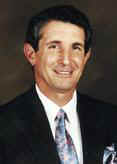An Open Message to My Congressman on Education: Just Keep
Quiet!
by Dr. John E.
Bonfadini, Ed.D., Professor Emeritus, George Mason University
|

John Bonfadini
|
I was sitting in church Sunday morning thinking about the
teaching profession when I should have been concentrating on the homily. I�d
read the paper before going to mass. One article discussed a proposed bill
in Florida that would abolish teacher tenure and tie teacher pay increases
to student test scores.
This seems to be the general trend these days in
discussions about the teaching profession: Teachers need to be held more
accountable for the perceived decline in student academic achievement,
social behavior, family values and a host of other things. But to me, making
teachers feel less secure by removing tenure and holding back pay doesn�t
seem like a good way to motivate educators. So much legislation dealing with
education has more to do with politics than student achievement.
The constant legislative attacks on the education
profession tend to demonize a part of our society that should have the
highest respect if it is to succeed. Past
generations understood that teachers and their profession must be viewed
with respect, even if some individuals in the profession were �borderline�
on deserving it. Kids were taught to respect the profession. Today we seek
to evaluate the profession by examining minute details of the educational
process and requiring a crisis intervention into every shortcoming.
In education, some things remain constant, some things
change. The constants are easily identifiable: Kids need to be able to read,
write, speak and do math to succeed in life. But
education also includes more subjective material to help round out the
student�s citizenship skills. How much history, technology, music, physical
education, foreign language, art, sports, job-skills training and similar
information and training does a student need? The real answer is it varies
for every student ... that�s why so much is written about individualized
instruction. Standardized tests just don�t do a good job with the
citizenship evaluation.
The teaching profession is very simple. I�ll use an art
analogy to illustrate my view. The goal is to paint something that�s useful
and appealing. To accomplish the task an artist must have the tools of his
profession: brushes, canvas, paint, easel, charcoal, pencil, pen, and other
tools, including fingers. Knowing what tools you need is useful. Now comes
the difficult part � using the tools to get something on the canvas. There
are as many different styles as there are different artists. Which style or
combination of styles to use is not an exact science. What�s pleasing to one
person may not be pleasing to others. The difficult part of teaching is
getting the paint onto the canvas and eventually creating a painting.
Knowing and naming the tools is important, but is still secondary to the
main objective, which is a finished picture.
One of the problems created by much of today�s
education-related legislation is that the majority of the paintings would be
done �by the numbers.� There is little space for creativity in a
paint-by-numbers world. Evaluate teachers by student test scores and you�ll
get paintings done by the numbers. �Number paintings� don�t show up on great
museums� walls, or even in most homes.
Every July, Cooperative Living publishes its annual youth
art contest results. Just look at the artwork in this issue. What a
beautiful contribution these children make to the issue with their
individual artistic expressions. We select winners, but in reality all the
kids win. They have been given a chance to learn and explore something
beyond the numbers.
As I lift my head, I see a piece of art done by my
granddaughter, Brooke. It�s been hanging there for about eight years. I
could give it a numerical grade, but the drawing�s underlying message, �I
love you, grandpap,� is beyond the numbers. I�ll trade my tenure for that
any day.
I see my other grandkids putting their ideas down on paper
every week. They love to express their thoughts with pictures. I just hope
some teacher doesn�t have to take away the canvas because we are now
requiring so much time for naming the tools of the trade. Speaking of trade,
it�s also okay if some students use a house as the canvas ... not every one
of us will be a Leonardo da Vinci.
I�m including a personal letter (pictured above) written
about six decades ago by my sixth-grade teacher, Mrs. Alsko. It speaks to
another great responsibility of the teaching profession: keeping Johnny in
his seat so that learning can take place.
Warming Johnny�s seat � now that�s an old concept that
might improve test scores. I read recently where it was making a comeback.
What do you think, Mr. Congressperson? I know what my mother had to say or
do in response to Mrs. Alsko�s note, and it wasn�t a call to her
congressman. My butt still hurts from Dad�s response. Support your child�s
teachers, even if they are not perfect � it�s for your child�s own good.
My children who are teachers are facing furloughs, no pay
raises, loss of benefits, increased workloads, and lack of workplace
financial support, like most other workers. I�ll speak for them in
response to those in Congress who think they know best: Just be quiet and
let the educators do their jobs.
In November, many campaigned on
providing increased support for education, then a few months later the same
individuals are recommending severe cuts in education budgets. Talking about
taking away tenure and using merit pay is a joke. Stick to fixing the
economy, because right now all elected officials are getting a failing grade
in that subject.